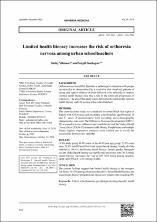| dc.contributor.author | Yılmazel, Gülay | |
| dc.contributor.author | Bozdoğan, Serpil | |
| dc.date.accessioned | 2021-11-01T15:03:03Z | |
| dc.date.available | 2021-11-01T15:03:03Z | |
| dc.date.issued | 2020 | |
| dc.identifier.citation | Yilmazel, G., & Bozdogan, S. (2020). Limited health literacy increases the risk of orthorexia nervosa among urban schoolteachers. Universa Medicina, 39(3), 162-170. | en_US |
| dc.identifier.issn | 1907-3062 | |
| dc.identifier.issn | 2407-2230 | |
| dc.identifier.uri | https://doi.org/10.18051/UnivMed.2020.v39.162-170 | |
| dc.identifier.uri | https://hdl.handle.net/11491/6944 | |
| dc.description.abstract | BACKGROUND Orthorexia nervosa (ON) describes a pathological obsession with proper nutrition that is characterized by a restrictive diet, ritualized patterns of eating, and rigid avoidance of foods believed to be unhealthy or impure. Limited health literacy may play a role in the onset and progression of orthorexia. The aim of this study was to determine the relationship between health literacy and ON among urban schoolteachers. METHODS This cross-sectional study was conducted in central Black Sea region of Turkey with 420 primary and secondary schoolteachers aged between 18 and 51 years. A questionnaire form including socio-demographic characteristics was used. The Orthorexia Nervosa Questionnaire (ORTO-15) was used to assess orthorexia nervosa behavior and the Turkey Health Literacy Scale (TSOY-32) to assess health literacy. Simple binary and multiple binary logistic regression analyses were carried out to verify the associations between the variables. RESULTS Of the study group 46.4% were in the 40-49 year age group, 53.8% were male, 78.6% had ON and 93.6% had limited health literacy. Nearly all of the orthorexics (96.4%) had limited health literacy. Female gender, Instagram use and limited health literacy was significantly associated with ON. Limited health literacy increases the risk of ON 4.85 times among teachers (aOR=4.85;95% C.I. : 2.15-10.94;p=0.000). CONCLUSION The current findings suggest that limited health literacy is the strongest risk factor for ON among urban schoolteachers. School health literacy and social media literacy programs can open a new window into revealing ON. | en_US |
| dc.language.iso | eng | en_US |
| dc.publisher | Trisakti Univ, Fac Medicine | en_US |
| dc.relation.ispartof | Universa Medicina | en_US |
| dc.rights | info:eu-repo/semantics/openAccess | en_US |
| dc.subject | Urban | en_US |
| dc.subject | Schoolteachers | en_US |
| dc.subject | Psychological Eating Disorder | en_US |
| dc.subject | Health Literacy | en_US |
| dc.title | Limited health literacy increases the risk of orthorexia nervosa among urban schoolteachers | en_US |
| dc.type | article | en_US |
| dc.department | Hitit Üniversitesi, Sağlık Bilimleri Fakültesi, Hemşirelik Bölümü | en_US |
| dc.authorid | Yılmazel, Gülay / 0000-0002-2487-5464 | |
| dc.identifier.volume | 39 | en_US |
| dc.identifier.issue | 3 | en_US |
| dc.identifier.startpage | 162 | en_US |
| dc.identifier.endpage | 170 | en_US |
| dc.relation.publicationcategory | Makale - Uluslararası Hakemli Dergi - Kurum Öğretim Elemanı | en_US |
| dc.department-temp | [Yilmazel, Gulay] Hitit Univ, Fac Hlth Sci, Publ Hlth Dept, Corum, Turkey; [Bozdogan, Serpil] Hitit Univ, Hlth Sci Inst, Corum, Turkey | en_US |
| dc.contributor.institutionauthor | Yılmazel, Gülay | |
| dc.identifier.doi | 10.18051/UnivMed.2020.v39.162-170 | |
| dc.authorwosid | Yılmazel, Gülay / AAC-5444-2021 | |
| dc.description.wospublicationid | WOS:000600012900003 | en_US |


















